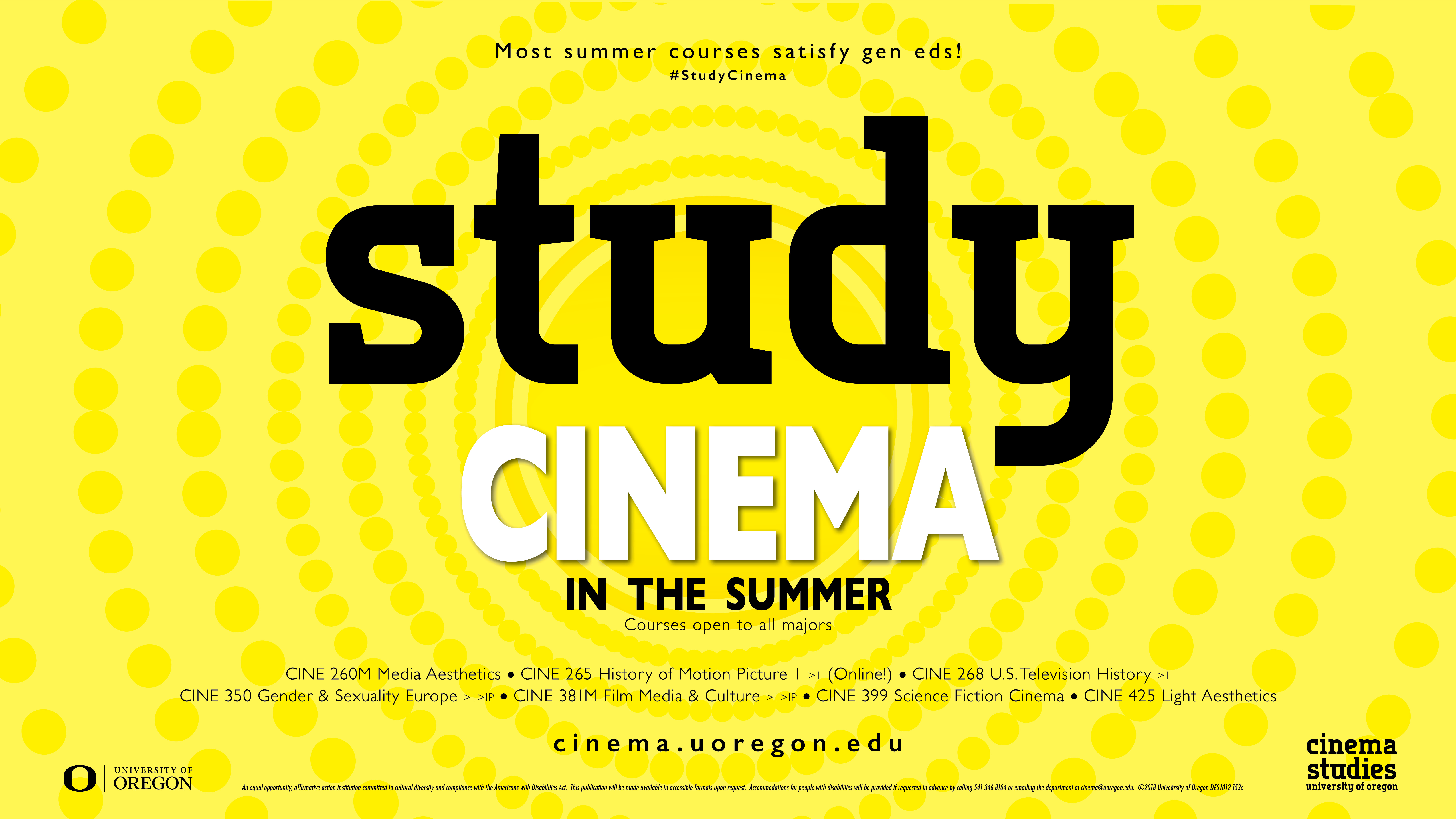Courses open to all majors!
Registration begins May 7, 2018. Read below for more information and course descriptions!

Courses below are open to all majors and most summer courses satisfy gen eds!
FIRST SESSION (6/25-7/22)
CINE 268 U.S. Television History >1 (4 credits) Open to ALL MAJORS!
Monday through Thursday, 12:00-1:50 p.m. / Zach Cheney
This course analyzes the history of television, beginning spanning from its roots in radio broadcasting to the latest developments in digital and streaming platforms. To assess the many changes across this historical period, we will address why the U.S. television industry developed as a commercial medium (compared to television industries across the globe), how television programming has both reflected and influenced cultural trends through the decades, and how historical patterns of television consumption have shifted due to new technologies and social changes. Priority will be given to the historical development of television and its relationships with radio, cinema, and new media along aesthetic, technological, industrial, and political lines.
CINE 381M Film Media & Culture >1>IP (4 credits) Open to ALL MAJORS!
Monday through Thursday, 2:00-3:50 p.m. / Ulrick Casimir
Focusing primarily on American/Hollywood filmmaking from the late 1960s through today, this course looks closely at the representation and function of African-Americans and women in film. Using both mainstream and independent films as our primary texts, we will explore how African-Americans and women are depicted in Hollywood filmmaking, a process that will include engaging with critical essays as secondary texts to help us assess the cultural meanings and values that African-Americans and women tend to embody. The main goal of this course is to help us understand how African- Americans and women have been and continue to be used by cinema, in ways that both reflect and reflect upon our culture.
Previously taught as ENG 381; not repeatable
CINE 399 Science Fiction Cinema (4 credits) Open to ALL MAJORS!
Monday through Thursday, 10:00-11:50 p.m. / Steve Rust
This course focuses on the development of the science fiction film genre as we explore the intersections of media, culture, and technology. Sci-fi cinema places the past and future into conversation with the present day, thus reflecting and responding to society’s evolving understandings of science and technology. Students will gain critical thinking and textual analysis skills as we analyze how sci-fi works to both mask and reveal cultural attitudes about gender and race, political and environmental issues, and, of course, robots and aliens. Course content is suitable for students taking their first film course and those majoring in Cinema Studies.
CINE 425 Light Aesthetics (4 credits) Open to ALL MAJORS!
Monday through Thursday, 12:00-1:50 p.m. / Kevin May
Light Aesthetics is a hands-on course exploring the technical, practical, and aesthetic use of light in cinema. Students will learn not only how to light a variety of scenes, but also how to understand the underlying meaning of light in images. We will also explore the history of cinematic lighting as well as the aesthetic use of color and contrast in films. In the production assignments students will work in both interior and exterior environments using artificial and natural light sources to control mood, tone, and focus, among other variables. Additional topics will include: DSLR exposure controls, working with flags, filters, and diffusions on set, and post-production color correction and grading techniques.
*Prereqs not enforced summer term.
SECOND SESSION (7/23-8/19)
CINE 350 Gender & Sexuality Europe >1>IP (4 credits) Open to ALL MAJORS!
Monday through Thursday, 10:00-11:50 p.m. / Steve Rust
This class examines questions of gender and sexuality within the transnational and national contexts of European Cinema, including its diverse cinematic landscapes, traditions, and star imagery. Through readings and film screenings from a wide range of countries we will explore a range of topics and genres, including: cinematic depictions of gender and sexuality within the aristocracy, cinematic portrayals of both traditional and transformative gender roles, the role of New Wave movements and aesthetics, Feminist and Queer film theory, and the changing dynamics of gender and sexuality in twenty-first century European cinema.
*Previously taught as CINE 410 Queer European Cinema. Not Repeatable.
CINE 381M Film Media & Culture >1>IP (4 credits) Open to ALL MAJORS!
Monday through Thursday, 2:00-3:50 p.m. / tba
Focusing primarily on American/Hollywood filmmaking from the late 1960s through today, this course looks closely at the representation and function of African-Americans and women in film. Using both mainstream and independent films as our primary texts, we will explore how African-Americans and women are depicted in Hollywood filmmaking, a process that will include engaging with critical essays as secondary texts to help us assess the cultural meanings and values that African-Americans and women tend to embody. The main goal of this course is to help us understand how African- Americans and women have been and continue to be used by cinema, in ways that both reflect and reflect upon our culture.
Previously taught as ENG 381; not repeatable
THIRD SESSION (8/20-9/16)
CINE 260M Media Aesthetics (4 credits)
Monday through Thursday, 10:00-11:50 p.m. / Sangita Gopal
This course will build on our abilities to watch, analyze and write about media objects, particularly film. We will learn to recognize, define and elaborate on various kinds of cinema (fiction, documentary etc), genres (musical, western, horror etc), elements of narrative (script, plot, point of view); we will develop an understanding of and gain familiarity with technical vocabulary used to analyze film form; we will examine in details aspects of film aesthetics including mise-en-scene, cinematography, editing, sound, and effects and learn to use terminologies relevant to each aspect of filmmaking as well as identify and analyze these elements in particular films. Finally, the course will situate its exploration of aesthetic concepts in a historical and cultural frame.
Previously taught as ENG 260; not repeatable.